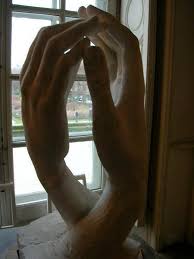
I am fortunate enough to have visited the Rodin Museum in Philadelphia years ago and, although my knowledge of art is limited, I immediately sensed upon seeing his work a fluidity that defied the fact that I was looking at a stationary object.
This is what art can do, I thought at the time and still think when I look at the many pieces of his works showing hands , that convey emotions through immovable pieces of sculpture. (In the photo at left, two opposite hands are intertwined at the four fingers with the thumbs touching.)
Rainer Maria Rilke, who worked as Rodin's secretary, wrote: "There are among the works of Rodin's hands, single small hands, which without belonging to a body, are alive. Hands that rise, irritated and in wrath; hands whose five bristling fingers seem to bark like the five jaws of a dog of Hell." And there is also tenderness in the sculpture above, a touching, a digital disembodied embrace.
Of course what does all this have to do with disability? Do I now fancy myself an art critic? No, I didn't even finish Art History at Rutgers, but fled back to an extra class of Shakespeare, leaving a very grateful art professor shaking his head behind me after I tried to quote literary references for an Escher piece.
"Oh no!" he exclaimed and not enthusiastically. "An English major."
I sighed because my wisdom was not appreciated and, at the next opportune moment, slunk back to the dean's office to drop the "art" course and return to my dear English department where I belonged. I thought. I was still in my teens and didn't understand that I would run into more Escher-like things than not, nor did I understand that living the question is often the best course of action, as Rilke pointed out. And I think, perhaps, that it has been my disability which has taught me that a willingness to live the question is key.
Have patience with everything that remains unsolved in your heart. Try to love the questions themselves, like locked rooms and like books written in a foreign language. Do not now look for the answers. They cannot now be given to you because you could not live them. It is a question of experiencing everything. At present you need to live the question. Perhaps you will gradually, without even noticing it, find yourself experiencing the answer, some distant day.
Letters to a Young Poet

No comments:
Post a Comment